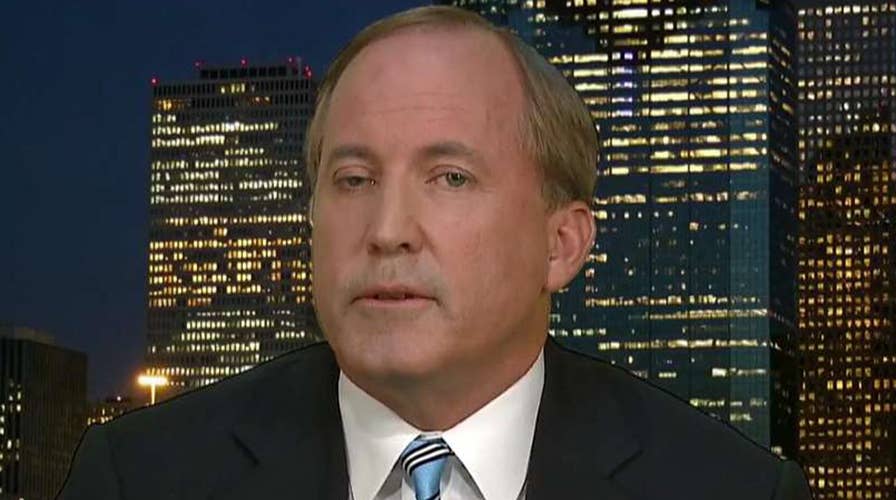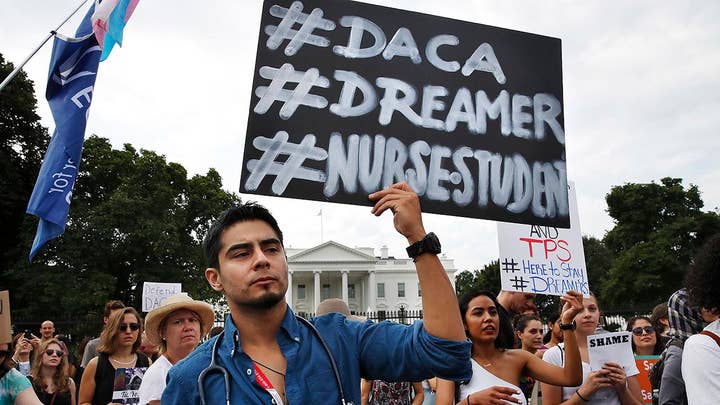Texas leads multi-state lawsuit asking judge to end DACA
Texas Attorney General Ken Paxton explains his challenge.
The state of Texas is seeking a nationwide injunction against the Obama-era Deferred Action for Childhood Arrivals Program (DACA), telling a federal judge in a hearing Wednesday that the government should be barred immediately from issuing or renewing more permits under the program.
Texas is part of a 10-state coalition that filed a still-pending lawsuit to end DACA in May. The state's attorney general, Ken Paxton, joined several other state attorneys general Wednesday in asking U.S. District Judge Andrew Hanen to halt DACA, which protects about 700,000 people from deportation, until that litigation is concluded.
Paxton said in a statement that the lawsuit was "vital to restoring the rule of law to our immigration system."
The Trump administration has sought to rescind DACA using executive authority, in a manner similar to how the Obama White House implemented the program. But federal judges have blocked these efforts, saying the White House cannot legally terminate an agency program like DACA under the Administrative Procedure Act (APA) for "arbitrary and capricious" reasons.
But in its motion for a preliminary injunction against new DACA permits and renewals, Texas turned that argument on its head, saying that in fact it was the Obama administration that failed to follow key provisions of the APA when it implemented the policy.
"DACA violated the procedural requirements of the APA because it was created without notice and comment," Texas' filing stated. Notice and comment procedures, in which the public is made aware of pending changes in the law and offered a chance to discuss them, typically are required when a new policy affects peoples' substantive rights and interests.
Paxton justified the need for a preliminary injunction -- as opposed to waiting for a decision on the merits of the case -- by arguing that the state had an urgent legal duty to protect its citizens, whom he said were being harmed directly by the soaring "healthcare, education, and law-enforcement costs" associated with DACA recipients, as well as the economic competition from illegal immigrants.
"Texas spent approximately $376,000,000 to provide Emergency Medicaid services to unlawfully present aliens over the last 11 years for which data are available," Texas wrote in its motion for a preliminary injunction. "Likewise, Texas spent approximately $6,200,000 to provide Family Violence Program services to undocumented immigrants over the last 11 years for which data are available."
However, opponents of Texas' request for an injunction rejected the idea that the state was suffering imminent, irreparable harm.
The Mexican American Legal Defense and Education Fund (MALDEF) told the judge that claims about DACA recipients draining state resources were "both irrelevant and grossly inflated."
Nina Perales, an attorney for MALDEF, questioned why Texas had waited six years to claim the program was causing "irreparable" damage if it really was such an imminent threat to residents.
Texas' lawyers also argued that DACA was an unconstitutional violation of the president's duty to take care that laws passed by Congress were faithfully executed.
The attorneys general of Alabama, Arkansas, Louisiana, Nebraska, South Carolina, and West Virginia joined Paxton in making the request for an injunction.
Hanen did not issue an immediate ruling Wednesday. But he asked pointed questions of both sides about how this case compared to his ruling three years ago against another expansion of immigrant protections by former President Obama.
In that case, Hanen ruled against an expansion of DACA and new protections for immigrant parents. A federal appeals court sided with Hanen and the U.S. Supreme Court split 4-4, leaving his ruling in place. The expanded protections never went into effect.
Texas now has asked for Hanen to stop the U.S. government from enforcing Obama's 2012 memorandum creating DACA. Three other federal judges have stopped President Trump's administration from ending DACA.
If Hanen rules in Texas' favor, legal experts said that conflict would draw the attention of higher courts and potentially the U.S. Supreme Court.
DACA has authorized around 700,000 people brought to the U.S. illegally as children to obtain work permits and driver's licenses.
"No one in this case is a bad guy."
On Wednesday, state attorney Todd Disher said the new case raised legal questions that Hanen already had addressed in his previous ruling.
The states technically sued the U.S. government because the government runs the program. But with the Trump administration aiming to end DACA, states that support the program intervened, along with MALDEF, to argue that the program should remain in place.
A group of people protected by DACA attended the hearing and protested outside the courthouse afterward. Hanen acknowledged the attention the case has received and its importance to DACA recipients involved in the case, who he said "were just trying to live the best life they possibly can."
He added, "No one in this case is a bad guy."
Hanen instructed attorneys on both sides of the issue to submit new filings by Monday.
The Associated Press contributed to this report.







